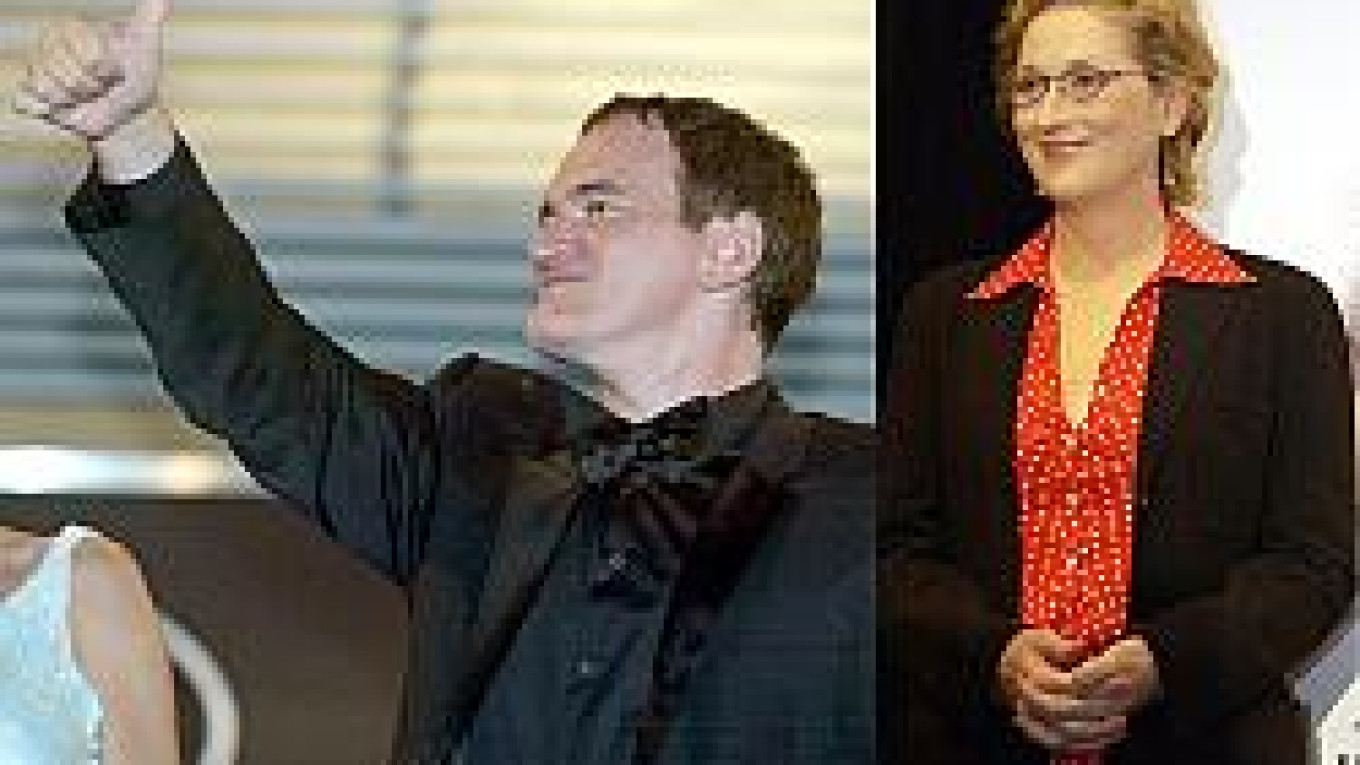This year's event has attracted a sprinkling of other stars -- Meryl Streep will attend to claim the Konstantin Stanislavsky lifetime achievement award, French actress Isabelle Adjani will also put in an appearance, and Emir Kusturica, the Bosnian director of "Black Cat, White Cat" (Crna Macka, Beli Macor), will present a gala premiere of his film "Life is a Miracle" (Zivot je Cudo).
The jury includes some celebrities of its own: Author Boris Akunin takes a break from writing about the exploits of Erast Fandorin to deliberate on the main competition entries under the chairmanship of Alan Parker, the British director of "Evita" and "The Life of David Gale."
Previously based at the Central Manezh Exhibition Hall, which burned down in March, the festival has relocated this year to Dom Kino, as well as to the Pushkinsky theater and other cinemas.
Homegrown films are well represented in the main competition, where three out of 17 entries were made in Russia. One of the most anticipated candidates is popular actor Vladimir Mashkov's second film as director, "Papa," in which Mashkov also stars as a father who dreams of turning his son into a famous violinist. St. Petersburg director Dmitry Meskhiyev presents the war drama "Our Own" (Svoyi), while documentary specialist Marina Razbezhkina makes her feature debut with "Harvest Time" (Vremya Zhatvy), the story of a peasant woman who wins a coveted Red Banner for her labor. A fourth entry, jointly produced by Russia and Azerbaijan, Vagif Mustafayev's "National Bomb" (Natsionalnaya Bomba) recounts the tortuous process of shooting a film in the southern republic.
Also in competition will be a range of international films, including a debut feature by South Korean scriptwriter Kim Soo-hyeon, "So Cute" (Kul Yeo Wo), about a father who used to practice sexual magic and now lives with his four sons, all born from different mothers. Representing Estonia will be "Revolution of Pigs" (Sigade Revolutsioon), by Jaak Kilmi and Rene Reinumagi, set during a rally of schoolchildren's labor brigades in 1986.
The highest wattage of Hollywood glamour will come from "A Different Loyalty," a romantic drama by British-born director Marek Kanievska, starring Rupert Everett and Sharon Stone in the roles of British defector Kim Philby and his wife, Eleanor.
This year's program also introduces Perspectives, a new competitive category featuring a controversial selection of first or second films by emerging directors. Chairing the jury will be Alexei Uchitel, the director of the much-lauded "The Stroll" (Progulka), which opened last year's festival.
Banned at home, but the first Belarussian film to make it onto the international festival circuit, "Mysterium Occupation" by Andrei Kudinenko presents an unofficial view of the country's wartime history. Meanwhile, Alexander Veledinsky, one of the scriptwriters for the popular television series "Brigada," will present his "Russian" (Russkoye), based on the autobiographical works of Eduard Limonov, the National Bolshevik Party leader and writer.
Also sure to raise eyebrows in the Perspectives section is "Ma Mere," a French art-house movie starring Isabelle Huppert as an alcoholic mother who introduces her teenage son to sex. The film was not permitted to enter the competition at Cannes, prompting producer Paolo Branco to complain of censorship.
Apart from the two competitions, the festival will present numerous side-shows, including a section of Brazilian cinema and retrospectives of works by Dutch avant-garde director Alex van Warmerdam, German filmmaker Alexander Kluge, and Canadian director Robert Lepage. Another series, titled Russian Trace (Russky Sled), will bring together foreign films that feature Russian actors and directors.
Also to be shown are recent international festival hits, including Park Chan-wook's "Oldboy," which won the Grand Prix at Cannes, and Pedro Almodovar's "Bad Education," which opened the French festival in the Gala Premieres section.
A Message from The Moscow Times:
Dear readers,
We are facing unprecedented challenges. Russia's Prosecutor General's Office has designated The Moscow Times as an "undesirable" organization, criminalizing our work and putting our staff at risk of prosecution. This follows our earlier unjust labeling as a "foreign agent."
These actions are direct attempts to silence independent journalism in Russia. The authorities claim our work "discredits the decisions of the Russian leadership." We see things differently: we strive to provide accurate, unbiased reporting on Russia.
We, the journalists of The Moscow Times, refuse to be silenced. But to continue our work, we need your help.
Your support, no matter how small, makes a world of difference. If you can, please support us monthly starting from just $2. It's quick to set up, and every contribution makes a significant impact.
By supporting The Moscow Times, you're defending open, independent journalism in the face of repression. Thank you for standing with us.
Remind me later.


